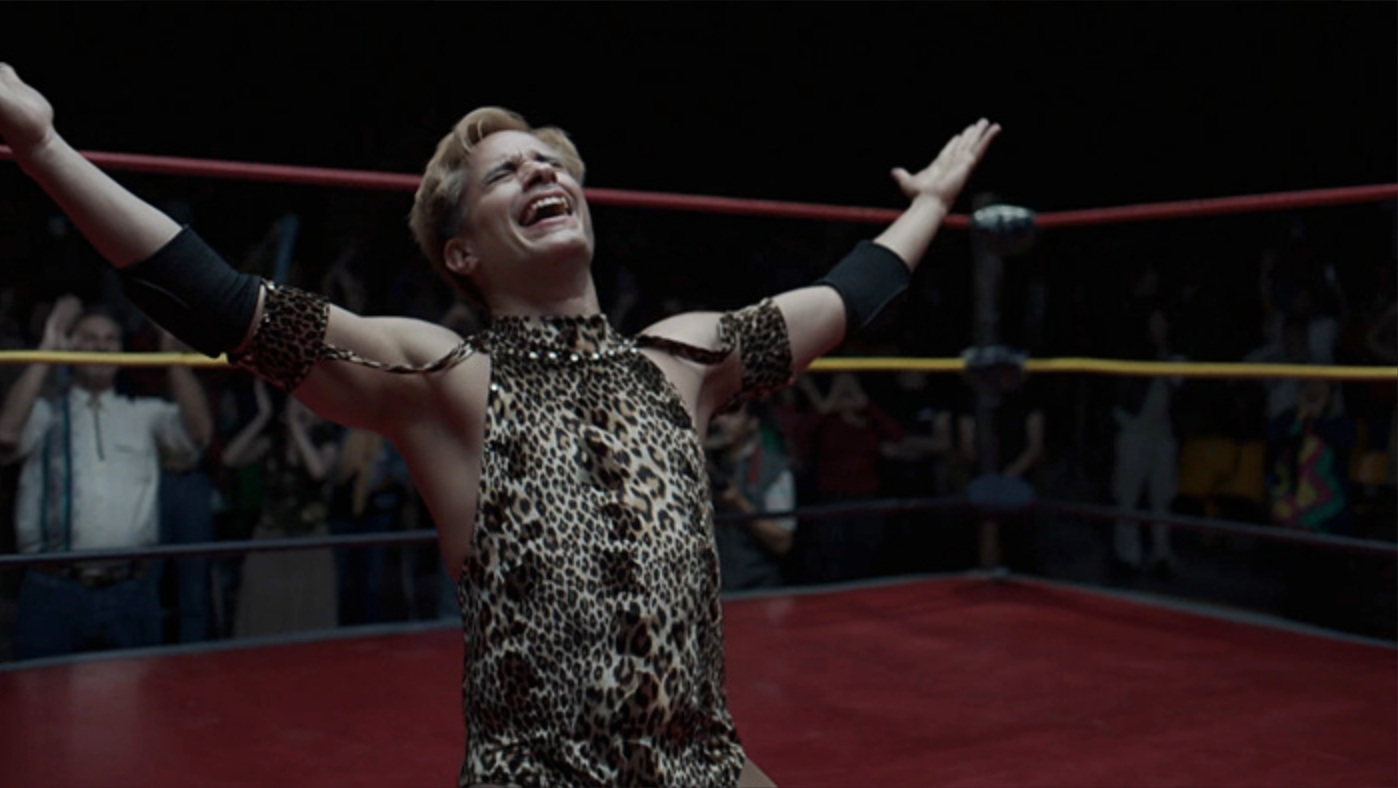Under stark fluorescent lighting, a rowdy crowd packs into an old warehouse, cheering enthusiastically for the hulking man in a menacing costume standing atop the wrestling ring at the center of the room. The mighty Gigántico, as this wrestler is known in the world of lucha libre, thunders back and forth across the ring as the twinkling opening piano riff of “I Will Survive” plays out. Over Celia Cruz’s rousing salsa cover of the disco classic, Gigántico’s smaller and far more scantily clad opponent steps gracefully into the spotlight—first with trepidation and then with increasing confidence, even while the crowd hurls slurs at him. Within minutes of the opening whistle, however, the crowd has switched loyalties, breaking out into a united chant: “Cas-san-dro! Cas-san-dro! Cas-san-dro!”
Following the real-life story of Saúl Armendáriz (Gael García Bernal), Cassandro (2023) is a film that clearly comes from a deep love for lucha libre. Like professional wrestling in the U.S., lucha libre fuses sport and theater, with each luchador embodying a specific character in a larger story about the universal fight between good and evil. As their name suggests, exóticos fulfill the need for an exotic, and thus dangerous, “other” for the audience to root against,“earning their ridicule from their feminine appearance and mannerisms. Even with its misogynistic and homophobic aspects, the openly gay Saúl feels a passionate pull towards lucha libre, rooted in childhood memories of watching matches with his estranged father.
Saúl sees himself as a connoisseur of lucha libre, criticizing other luchadors for bringing no “poetry” to the sport. He sees the unappreciated talent of the exótico: while the crowd jeers, Saúl watches, rapt, as an exótico takes to the ring, impeccably made-up, resplendently dressed, and even graceful in his choreographed fighting. From the film’s beginning, Saúl’s view of lucha libre predisposes the viewer to admire its artistry, rather than focus on its conservative politics.
While Saúl does face some anti-gay discrimination during his journey, the film largely hinges on his personal relationships rather than the struggle with lucha libre’s gatekeepers. Although this approach prevents Cassandro from reaching its full potential, the film redeems itself as a visually appealing underdog story.
Though Saúl’s close relationships with his lover Gerardo (Raúl Castillo), a closeted fellow luchador, and his mother, Yocasta (Perla de la Rosa), are emotionally compelling, focusing on them draws away from the more incisive exploration of lucha libre. On one hand, the sport is a form of self-expression— as Saúl’s trainor Sabrina (Roberta Colindrez) puts it, lucha libre is about being “you.” On the other hand is the sport’s tradition, emphasized by Saúl’s agent Lorenzo (Joaquin Cosio), who reminds Saúl that lucha libre is about providing the audience an escape from their “fucked-up world” by creating a space where “good triumphs over evil.” By re-envisioning Saul’s character in lucha libre as an outlet for individual expression, rather than a predetermined role in a larger story, Cassandro hopes to radically challenge lucha libre norms. Unfortunately, though, this thematic exploration gets sidelined by multiple plotlines involving Saul’s personal relationships, leaving it underbaked.
As a result, this tension between tradition and innovation doesn’t fuel nearly enough of the film’s plot—Saúl encounters limited resistance from the old guard in his pioneering re-imagination of the sport. Nevertheless, Gael García Bernal carries where the script thins, bringing Saúl’s every thought to the surface; Saúl is unfailingly earnest, and Bernal channels his joy (and sorrow) masterfully. Through his physicality, Bernal clearly distinguishes Saúl from his flamboyant, confident lucha libre persona. While Saúl hunches into his small frame, Cassandro eagerly takes up space, limbs flailing and face contorting with dramatic confidence. Still, Bernal can’t save the film from its uneven pacing and plotlines that are confusing, unnecessary diversions—Saúl’s friendship with Bad Bunny’s Felipe adds virtually nothing other than one-sided sexual tension and wide-eyed, doting glances, and even the central conflict between Saúl and his estranged father is resolved summarily.
As an unfortunate consequence, the lucha libre scenes themselves feel more like an interlude rather than an integral part of the film. It’s a shame, given their aesthetic and dramatic strength as action scenes. Most notably, Cassandro’s face-off with the son of his childhood idol, El Hijo del Santo, is a tense and tightly-choreographed marvel. Lower definition cameras in fixed positions, mimicking the style of televised lucha libre matches, alternate with another that roves in and out of the ring, evoking the chaos and blood-pumping energy of a real match. As El Hijo de Santo persistently frustrates Cassandro, his loss of control is undeniably gripping. Here, Saúl’s emotional journey and his evolution as Cassandro seamlessly merge, and it’s clear how integral the Cassandro role is to his personal growth.
Despite the seemingly high stakes of Saúl’s trailblazing approach to lucha libre, Cassandro is a film mired in predictability. The movie is driven by neither surprises nor major swells in plot. Instead, this sense of certainty, coupled with the directionless underlying level of tension that hums in the background, dulls the impact of both Cassandro’s highs and lows, reducing the film to a tonally murky, unevenly paced sub-two-hour affair. Indeed, every aspect of the storytelling—which wavers between seamless and painfully overt—reinforces the inevitabilities of Saúl’s life. From the outset, it’s clear that his career will flourish, while his constant struggles with family and self augur further strife in his personal life. This foretold challenge is made obvious as the dialogue switches between Spanish and English—Saúl speaks exclusively in English with his lover, too clearly signaling to viewers their distant, fundamentally doomed relationship and Gerardo’s inability to accept his true self, both with regard to his sexuality and his heritage.
Beyond the theatrical world of lucha libre, through its exploration of Saúl’s interiority, Cassandro serves as an ode to the distinctive experience of being Mexican American and living in a border city like El Paso. Saúl’s relationship with his mother illustrates the complexity of this cultural fusion, as their closeness originates, in part, in Saúl’s rejection from the conservative, Christian, all-American family his father built. Together, Saúl and Yocasta forge a way of life that brings together their Mexican heritage and the realities of living in the United States. Although Cassandro largely focuses on Saúl’s personal grapples with identity, it occasionally turns its attention to El Paso’s broader context. In a brief but poignant moment, Yocasta urges Saúl to offer fleeing migrants who pass their home food and water; of course, they’re already gone, running for their lives. Still, the scene reveals an intimacy with the pains of migration that can only come from living on the border.
At the simplest level, Cassandro is about how one man changed lucha libre. But refreshingly, the film largely rejects the convenient “great man” approach to telling Saúl’s story, rarely stopping to bask in his accomplishments (save for one phenomenally executed scene portrayed as a flash forward near the end of the movie). Instead, it opts for a quieter and less bombastic style, one that demands a sense of focus, subtlety, and complexity that the movie, at times, fails to consistently achieve. Despite its flaws, this more measured, muted approach is fitting for a man whose passion for lucha libre comes not from some selfish pursuit of glory, but rather from a deeply personal relationship with the sport, born from a lifetime of pain, wonder, yearning, and joy. Saúl sets out to be an exótico who performs mesmerizingly beautiful lucha libre and wins while doing so, and he handily achieves both aims. But as Cassandro understands, Saúl doesn’t need to be a hero. He’s just in it for the love of the game.





